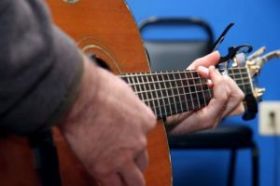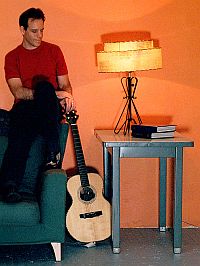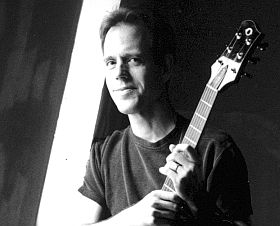|
BB: Tell me about your guitar.
David: At home I have my Olsen guitar that I write on;
when I travel, I have an indestructible guitar, the RainSong
guitar. They have the same pickups in them, so from the
audience's perspective it sounds pretty much the same. The
travel guitar gives me so much more energy, the energy that I
would otherwise spend worrying about getting my guitar to where
I'm going, when you have to check it on an airplane. The travel
guitar is unbreakable. Every musician spends so much energy
worrying about their guitar as if it were their own heart. It is
an interesting thing to have a heart that is now really strong,
and really unafraid of the hard knocks that it might require
getting to where you're going. So, I like the parallel of this
travel guitar being a real road warrior.
BB: Tell me about your
audience.
David: My favorite people to sing for are people who are asking
a lot out of music. They're asking a lot because their lives are
at a turning point, and they're looking for what can they trust,
in terms of how to make their decisions. So they come to music
with bigger questions, and they want songs that don't waste
their time with niceties that aren't true, they want songs that
have been to the darkest places they've been to, and somehow
shine a light through.
THE BOSTON MUSIC SCENE
BB: Tell me about playing in Boston.
David: I have a lot of memories of playing in Boston. I really
misjudged the personality of the town when I first starting
playing there. It has this wonderful kind of self-conscious,
really smart... it's very suspicious of sentimentality, and
that's really fun. There are songs that go over great in Boston
that don't work anywhere else, and vice versa.
BB: You say you misjudged. What were you misjudging?
David: Well, when I came from playing in Asheville, North
Carolina for the first time and played in Boston, I played songs
that were kind of too sweet, too sort of simply naďve, innocent
kind of songs. It's what I was feeling, and I didn't translate
for the audience so they could hear what I meant. Because my
perspective on my music is, you know, I had been through such
hopeless depression, and gradually assembled things that could
keep me buoyant in that ragwater and blue ruin, as Tom Waits
calls it, so I lashed these buoyant things together, these
songs, these ideas, these things that I could create a kind of
raft out of. And I did a good enough job of it that I started to
sound like I had been out of that water long enough to dry off,
and to not remember what it was like to be scared, to have my
legs dangling in that dark deep. I didn't include where I was
coming from when I first played in Boston. But it was fun to get
to know the mood of that town as it showed up for me, and learn
how to speak in a way that they could get it. Boston was my
first city, you know...
BB: In what way?
David: I grew up around Cleveland, and just always felt like I
needed to get away, and I didn't know where. And so when I came
to Boston the first time, it was 1978, springtime. I was working
at the Children's Museum when it was in Jamaica Plain. I would
go to hear music every night, every single night. And it was
great. I was living in Allston and I would walk up over the
pedestrian bridge over the tracks into Cambridge, and I'd go to
the Blue Muse and Passim and the Nameless Coffeehouse, and I
would just go to music every night. It was like pistachios, only
more so, the work that it took to get to a good song.
 BB: Tell me about that. BB: Tell me about that.
David: I would sit through endless boring people doing their
approximations of what they wanted to impersonate, and I would
finally hear somebody who was speaking or singing in a way that
I suddenly knew so much about how it felt to be them. That's
what I went for. I went for music that was suddenly real and
powerful, and gave me a window into the way they saw the world.
So, that's why I would go every night, because every once in a
while, there would be this opening, and it would be worth it,
just to get that glimpse. You know, so often people would
translate into songs just the frustration of where they were. So
all their singing is, “This is wrong” and “that's wrong,” and
“this is wrong and that's wrong.” What I wanted was people who
were willing to do something with it, to do some emotional
alchemy, to actually take the heat, to be the crucible that
would refine that, and get to the gold, get to how to make this
life shine. There were people who did that back then, and a lot
of them were street musicians. So I would just keep showing up,
keep asking, can you give me a glimpse of the way you see the
world? Can you play a song that communicates where you find your
hope? How you get up in the morning, how you believe that this
is worth living. That was the kind of stuff I really needed to
hear.
BB: You played Club Passim recently. Tell me about your
experiences at Club Passim.
David: It was always frustrating way back, playing Club Passim,
because the sets were so short... an hour, maybe less than an
hour, I can't remember. Fifty minutes maybe, sort of rings in my
ear, I dunno. But it was like NOTHING. You just barely get
started. And I love the time-lapse thing that happens while
music works on us at a subtle level. And so for me, an
hour-and-a-half, you can sort of bask in the healing waters of
music for an hour-and-a-half and really start to feel it in your
bones. And it's not just the cool-off dip, it's what the water
does. So the short sets were frustrating, but the place had a
majesty, a wonderful mystique from just going to hear music
there.
INFLUENCES
BB: What artists would you consider to be your musical
influences over the years? Artists that influence the kind of
music that you've done?
David: I’d say the most important ones are the ones on the
street, the people who showed me that music is in our hands, and
it's a language that anyone can take. They are the ones that
made it possible for me to imagine that music is not a creation
of the fashion industry, but that it is a language that stirs
from our hearts.
BB: If you could go back in time and tell a sixteen year old
version of yourself of a person you met in your adult life that
you probably didn't expect to, what are some of the names of
people that that sixteen year old version of you would be
impressed that you got to meet?
David: The sixteen year old version of me would've been
impressed that I was talking with James Taylor and Jackson
Browne and people like that, that their music that stirred me.
But, it doesn't serve James or Jackson or me, to think that what
I felt came from them. What I would like to say to the sixteen
year old version of myself is, trust your own heart.
BB: If you could play on stage with anyone alive, who would it
be?
David: When Sarah McLachlan came out with the Surfacing tour,
and sang “Arms of the Angel”… She's singing with such
compassion, she sings it like the angel. The mercy in that song
is so beautiful, and when that song was new, and it came over
us, I would have loved to sing the harmony that I sing so well
when I'm in my car, and I'm singing along. I would put my whole
heart right there.
IN CLOSING
BB: If you had to be in another profession other than your own,
what would it be?
David: I love leading adventure trips, and I'm actually getting
more gigs now where they say you don't have to bring the guitar
if you don't want to. I could easily do conflict resolution, I'd
love that. It'd be satisfying to dream up simple technical,
mechanical solutions to stuff. I'd love to be on a team with a
couple fix-it guys, in settings where you need to improvise. I
love fixing things. That would be very satisfying.
BB: What advice would you have for aspiring Boston musicians
that might be reading this interview?
David: Look beyond, look not just at the song but what it stirs
and what that stirring is pointing towards. By that I mean,
don't go chasing more songs. What I would ask them to do is to
listen for their own heart's guidance, as it shows up in these
simple outside things like a song. If you're the kind of person
who is moved by music in subtle and strange and beautiful ways,
trust that you have been given a language, and trust that
language to lead you home.
BB: Thanks for talking with Boston Beats.
David: Thanks.

PREVIOUS SECTION
To learn more about David Wilcox, visit his website at
http://www.davidwilcox.com
*Pictures courtesy of http://www.davidwilcox.com |